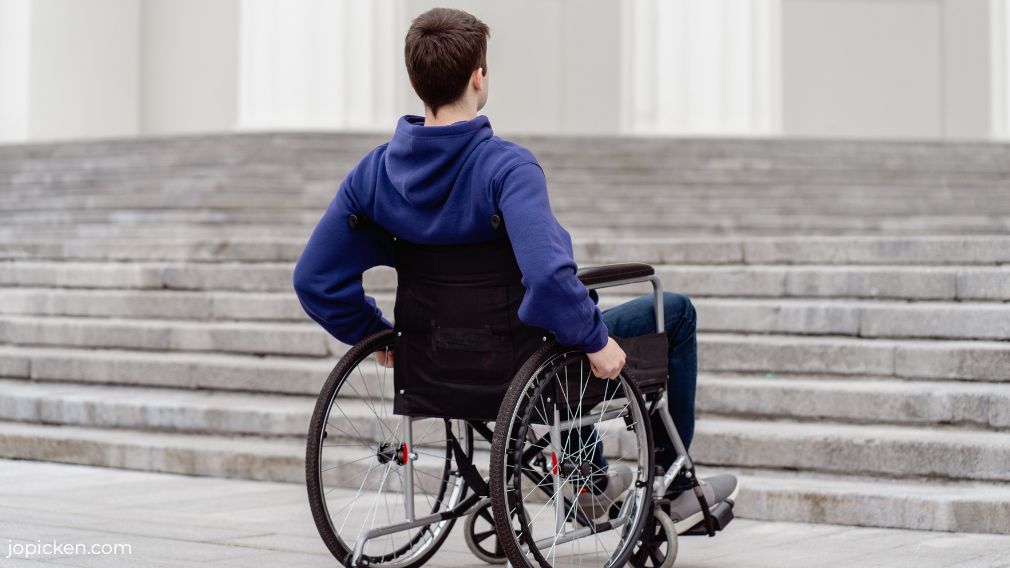We would never question a ramp for a wheelchair user. We’d never expect someone with mobility needs to just “try harder” to climb the stairs.
But somehow, we still expect neurodivergent students to power through without support.
We justify it with phrases like “They just need to focus more” or “It’s not fair to the other students” or “They will be fine once they settle down.”
This kind of thinking causes real harm. Because the truth is simple: letting a student with ADHD, anxiety, dyslexia or any other hidden disability struggle without support is no different to refusing someone a ramp and then blaming them for not making it up the stairs.
Just because you can’t see the need doesn’t mean it isn’t there.

Hidden disabilities are still disabilities
Dyslexia is real.
Anxiety is real.
Yet, neurodivergent young people are too often labelled lazy, disruptive, or not trying hard enough.
In fact they are trying. Every single day. Many of them are trying ten times harder than their peers just to hold it together. To manage their environment. To follow the rules. To survive a system that wasn’t designed for their brains.
Accommodations aren’t special treatment. They are access. A levelling of the playing field.
Explicit instruction. Extra processing time. Fewer transitions. Movement breaks. Flexible thinking. Predictability. Emotional support. These aren’t luxuries. They are what make education accessible.
Still, they are often denied, until a child is in crisis. Until they are burnt out, anxious, refusing school, masking every waking hour, or being punished for behaviours that are actually signs of distress.
We don’t need more assemblies about resilience. We need systems that stop breaking children in the first place.
But here’s where it gets deeper. Because these kids don’t stay kids forever.
They grow up.
This isn’t just a school problem. It’s a society problem.
Those same unsupported kids become adults. Adults who were never taught how to regulate. Adults in constant survival mode; not how to build systems that suit their brains. How to ask for what they need without feeling like a burden. How to effectively advocate for themselves.
They become employees who are labelled inconsistent or unreliable, business owners who burn out trying to work the same way as everyone else and parents who believe they are failing because they can’t do it all.
Nothing about their brain has changed. The need for accommodation doesn’t disappear when you turn 18 or leave education. ADHD doesn’t get easier because you hit adulthood. Dyslexia doesn’t magically sort itself out when you get a job. Anxiety doesn’t calm down just because you’ve learnt to keep it hidden.
It just gets harder to talk about.
Harder to advocate for.
Harder to spot when you have spent your whole life being told it’s your fault.
There’s no SENCO in the workplace. No supportive teacher explaining your learning style. No one looking out for your regulation levels. You are just expected to know how to adult like everyone else. When you don’t , the consequences can be brutal.
- Missed deadlines.
- Overwhelm.
- Shutdowns.
- Rejection sensitivity dysphasia.
- Late payments.
- Executive dysfunction.
- Lack of self worth.
- Judgement.
Plus a mountain of shame that sits heavy on your chest while you pretend you are fine.
Adults need accommodations too
We need flexibility.
Clear communication.
Processing time.
Emotional safety.
Tools that reduce mental load.
People around us who understand that we are not being awkward, we are just trying to make it work.
This isn’t about getting special treatment. It’s about having equal footing.
It matters. Because if we want to live in a world that includes everyone, we need to stop treating inclusion like it only belongs in a classroom.
The ramp doesn’t disappear when the bell rings.
You are still allowed to need it.
You are still allowed to build a life that works for you and you are definitely allowed to stop apologising for it.
Because access isn’t optional.
Not at school.
Not at work.
Not in life.
If this hits home, you’re not alone.
I work with neurodivergent adults every day who’ve spent a lifetime masking, pushing, and burning out in systems that were never built for them.
If you’re ready to stop forcing yourself to fit and start creating a life or business that works with your brain — get in touch.
Whether you need practical support, mindset shifts, or someone who actually gets it, I’m here.
You don’t have to do it the hard way anymore.
🖤 🖤 🖤

0 Comments